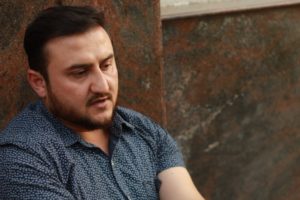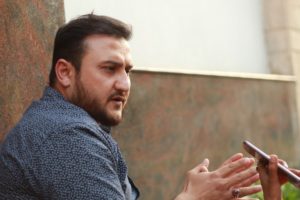 I was lucky enough to hear your story. If you are willing, can you share it with us?
I was lucky enough to hear your story. If you are willing, can you share it with us?
I am Khalid Ahmad Mominzadah and I am from Afghanistan. I am a journalist and also a filmmaker. Right now, my status is that of a fugitive. My homeland is Afghanistan. All I have is from my country.
During the time of my education there was not much hope for a better life but still, we had a life. There were problems for people and society.The important part in my life is the period of Taliban restriction for girls. There was no freedom. But still, we were living under peace. There was no war in Kabul. My father and family encouraged me to study and so, I graduated from high school. In 2001 after 9/11 happened, the Taliban regime collapsed. American and international forces came into the picture.
How did the Al-Qaeda regime happen in Afghanistan?
During the time of 9/11, I was learning to speak English and there was a talk of Al-Qaeda. We knew America was going to invade and the bombardment started. The fear was for everyone. My father decided to go away from the country till the situation. We went to Pakistan and there I joined a Japanese media house. There I realized the world believes my country is the centre for terrorism. I started working with the Japanese media for documentaries and entered back to Afghanistan. That was the time when the new regime was decided by the international society and a temporary government was set up. In 2002, my family came back to Afghanistan and we settled back there and Taliban regime had collapsed. It was a new thing for Afghanistan, the freedom and democracy.
It didn’t take very long time for the war to begin again, the Taliban issue was raised and the troops came again. This war was something different.
There were no designated war areas? It could happen anywhere?
Yes, yes anywhere it was happening, the same thing is happening today also. So I kept studying and working in Afghanistan. I completed by studies and got a lot of achievements from the TV channels, I had created many documentaries as a producer, co-director, researcher. I’ve worked as a correspondent even in Kabul and it was something going very well. It was not too late, I could make my career. I got opportunities to go abroad for big projects There was a big film called Osama. And I worked on it as a co-project coordinator. We also remade a documentary behind the scenes of that film which won the best documentary award..
……. The feature film won a golden globe.
For the ministry of Defense, I was the only journalist working in this field. So this time again I faced the problem when I was working in eastern Kabul where there was Taliban or insurgence in an area called Uzbin Valley.
While I was covering the Naghlo dam infrastructure, I heard something happened and that they wanted to explode the Dam. So I made a report that was going on every year. Later, they bombed that area where they killed the local people. I was working on my programs when I received threats. I used to go to the upper house parliament and even a Parliament member threatened me.
 So, what led you to move to India?
So, what led you to move to India?
I was followed by some unknown and armed people and they wanted to harm me, my family and my home. It was February 2009 and I even asked for security from the office. I approached for government protection but I knew it was not possible. It was the time when most of my friends were killed and beheaded. I was married and had a small family. So, I planned to move out of the country for a while. I had no financial or economic problems then.
On 20th February 2009, I left for India. Things were getting worse and I came to know that my parents were being followed and my brother got kidnapped. I had a 3 months visa so after that expired I approached the authorities in Delhi. So, after 7 months or something they gave me the refugee status for almost a year. Since then I am here in India.
So, you came to Delhi first when you fled Afghanistan. Where do you stay right now?
I stayed in Jangpura extension in Delhi. Here, my life changed and I found myself doing nothing. The period of 6 months was of a deep depression. My wife was pregnant. I went to look for the opportunities and somehow, I survived. I went to BOSCO. The initiative of working for UNHCR, I joined them in some language classes. I joined the youth groups and became youth leader in Delhi. Then, I thought, I am still alive. This was the time when I wanted to write a book on myself and the title of the book would be “The Man Who Disappeared”. But not like Mr. India. (giggles).
I tried so many jobs- a car washer. One day I had a cycle and I thought to come by early in the morning to wash some 5-10 cars and will wait if somebody pays me. I got a very big price of beating from so many people. So, I have been struggling for 9 years in Delhi and I am still struggling.
How long do you hope it’ll take till you go back to Afghanistan? If not India, are you looking for any opportunities anywhere? You’re profound in your language and the work. How did you manage to reach here?
Well, let me tell you one thing… I’ve not reached anywhere. I’m still there when I came here.I’m thankful to God for whatever I have. It’s okay, my babies are going to the school. However, we’re not integrated.
Reintegration- It means that somebody settling as a refugee in another country. I don’t see any reintegration for myself because it means you’ve valid or legal documents or citizenship that I don’t have. So my question is where is Reintegration? Im fighting to acquire this resettlement in the country. It’s 9 years and I’m here. If you don’t have the documents, nobody will trust you. How will you work then?
Your children are born in India. How do they react to their scattered sense of belongingness?
My 11 year old daughter is growing now and she is asking me all the time. “What is my father’s job?, she asks. It’s very difficult.
Physically, UN and UNHCR, see the conditions of refugee, how they live in harsh conditions. Their struggles and their livelihoods under the tents. They’re for the refugees but for the people who somehow try to maintain their life, there is no life. Because sometimes knowing something is worse than not knowing it. I know something is happening in front of me and I can do a lot but I don’t have the power. Maybe, there’ll be a chance when I will work as somebody in the world. Of course in India, there’s corruption, us refugees are working using that path, like driving the car without a license or acquiring it illegally. I was the one fighting against corruption but now I’m here living a corrupted life to survive…it kills me inside. The filmmaker of the documentary Osama has won prizes and he’s a refugee too. We’re the same, they’re the same. We all are under the tent.


With thanks! Valuable information!
With thanks! Valuable information!